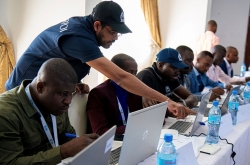SINGAPORE – While many governments recognize the need to take action against cybercrime, they face difficulties in defining the problem at hand.
To effectively tackle the multifaceted and imperceptible nature of cybercrime, criminal justice authorities need a good understanding of the scale, types and impact of the crime. For this reason, the Council of Europe and INTERPOL have jointly developed the Guide for Criminal Justice Statistics on Cybercrime and Electronic Evidence to support countries develop a clearer vision of the global problem.
The key goal of this joint effort is to help criminal justice authorities worldwide acquire the statistics on cybercrime and electronic evidence by providing good practices and recommendations. Statistics enable the authorities to shape effective policies and operational responses. This guide lays out the agenda for compiling criminal justice statistics with key steps for data collection, analysis and cooperation among multiple stakeholders.
“Well-defined statistics produced in collaboration with criminal justice authorities will not only provide valuable insights into the changing environment, but also strategic indicators for measuring the effectiveness of policies and activities,” said Alexander Seger, Head of the Cybercrime Division of the Council of Europe.
“How countries approach cybercrime and electronic evidence at the national level has a real impact on available options on global cooperation. It also serves as the cornerstone for developing tailored operational responses to reduce the global impact of cybercrime,” said Craig Jones, INTERPOL’s Director of Cybercrime.
INTERPOL and the Council of Europe will continue to cooperate to enhance the ability of criminal justice authorities worldwide to tackle cybercrime and encourage international cooperation in collecting and analyzing electronic evidence.









